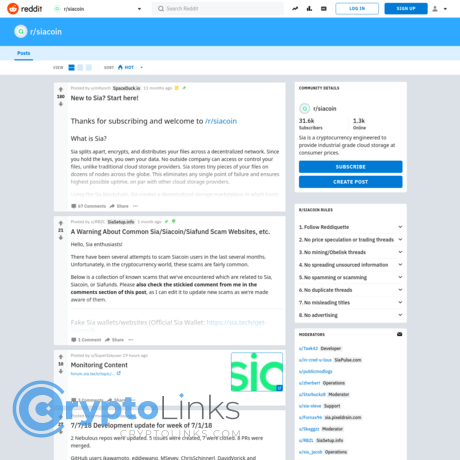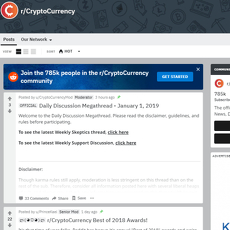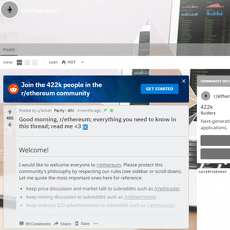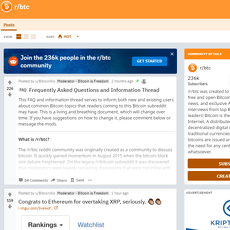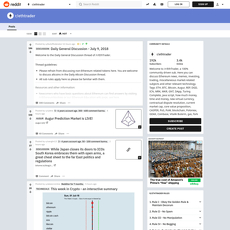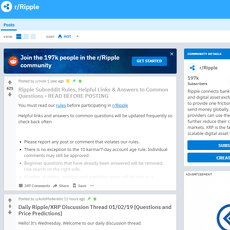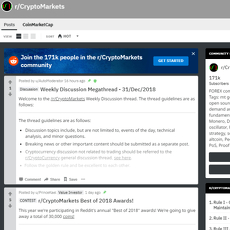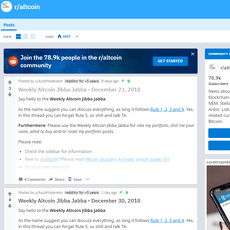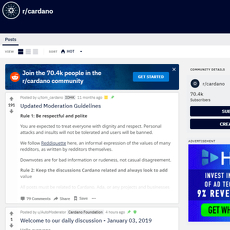r/siacoin Review
r/siacoin
www.reddit.com
r/siacoin Reddit Review Guide: the straight-talker’s walkthrough + FAQ
Ever open r/siacoin, scroll for five minutes, and feel more confused than when you started? You’re not alone. Between price hype, half-correct “guides,” and real technical updates that get buried by memes, it’s way too easy to miss the signal.
I put together this no-fluff walkthrough to help you use the subreddit like a pro—find what matters, avoid the junk, and get answers that actually move you forward in the Sia ecosystem. It’s written for everyday users, not bots or bag-pumpers. It’s going live on CryptoLinks so you can reference it anytime.
The pain: scattered info, price hype, and mixed-quality advice
Here’s the honest problem with r/siacoin: the great posts are there, but the subreddit can feel like a messy attic. You’ll find gold, but you’ll also find a lot of stuff that wastes your time.
- Price talk drowns substance: A thoughtful post about renterd or hostd stability gets less visibility than “SC to $1 this week?” threads. Good info slips through the cracks.
- Outdated tutorials linger: You’ll still see guides referencing older tooling like Sia-UI or siad when many setups have moved to renterd/hostd. Mixing old steps with new software leads to avoidable errors.
- Conflicting advice: One comment says “forward these ports,” another says “don’t bother,” and a third suggests a mystery script. Without context (versions, OS, logs), you can’t tell what’s actually correct.
- Scammy outreach: A classic pattern: a fresh account replies, “DM me on Telegram for Sia support.” That’s not support—that’s bait. Unsolicited help that moves the conversation off-platform should raise alarms.
Short version: r/siacoin is valuable, but you need a map. Without one, you’ll burn time and confidence.
This isn’t just a crypto thing—decades of usability research show most people skim online content. Skimming plus noisy threads equals missed details and wrong takeaways. Add in social proof (upvotes, early comments), and it’s easy to anchor on opinions instead of facts.
What you’ll get from this guide
- A simple way to use r/siacoin for real signal: where the good stuff lives, and how to filter for it
- Quick pattern-spotting tricks to ignore hype and chase root causes (not hot takes)
- A clean workflow to check news, releases, and community feedback without getting lost
- Practical safety tips to avoid DM traps, fake “support,” and sketchy links
- Clear answers to the questions people ask daily: Is Siacoin legit?Why is it going down?Will it be worth anything?What’s the future?
Who I wrote this for, what we’ll cover, and a quick heads-up
- Who it’s for:
- Newcomers who want to understand Siacoin and the subreddit fast
- Holders, hosts, miners, and builders who need reliable updates without the fluff
- What’s inside:
- How the subreddit works (rules, flairs, and stickies)
- Where the best threads and recurring updates live
- A research workflow that cuts through noise and confirms facts
- Scam safety must-knows so you don’t get burned
- A straight-talker’s FAQ on legitimacy, price moves, value, and future outlook
- Heads-up: This is not financial advice. Treat this guide as your smart starting point and always double-check sources against official announcements and code repositories.
Ready to stop guessing and see what you’ll actually encounter inside r/siacoin—what gets posted, how mods keep it clean, and where the signal starts? Let’s flip the lights on in the next section.
r/siacoin at a glance: what it is, how it’s run, and the vibe
If you’re trying to figure out whether r/siacoin is worth your time, here’s the honest read: it’s a builder-leaning subreddit that keeps price noise contained, prioritizes release info and practical help, and has mods who nuke spam fast. Expect a mix of Sia Foundation updates, real troubleshooting, and long-term network talk—not the usual “wen moon” carousel.
“Signal beats noise when you know where to look.”
The tone is direct and usually helpful. Hosts compare notes, renters share gotchas, and dev updates land quickly. Price chatter exists, but it’s usually corralled into megathreads so real questions don’t get buried.
Subreddit basics: rules, flairs, and stickies
Start with the sidebar on r/siacoin. On desktop it’s obvious; on mobile, tap the “About” or the three dots to see rules and links. You’ll save yourself time—and a few headaches—by knowing what flies and what gets removed.
- Rules you’ll actually care about: no scams or “support” DMs, no referral links, keep price posts in the designated thread, stay on-topic (Sia, Siacoin, hosting, renting, development).
- Flairs that matter: look for tags like Support, Discussion, News, Release, Hosting, and Renter. Use the flair filter at the top to hide what you don’t need. If you’re troubleshooting, filter to Support; if you’re catching up, filter to News/Release.
- Stickies (pinned posts): you’ll often see a Weekly Support Thread, a Price/Market Megathread, and sometimes a pinned Release Notes or Read This First post. These stickies carry a lot of value and keep repeated questions from clogging the feed.
Real example of using flairs well: if you’re setting up a host with hostd and hit an error, filter to Support and search within that view. You’ll usually find a post titled something like “hostd won’t announce — NAT issues” with logs in the comments and a solution the mods or regulars have confirmed.
The content you’ll actually see
The Siacoin subreddit isn’t just price talk—it’s a running ledger of network progress and user experience. Typical posts look like this:
- Foundation updates: links to blog.sia.tech, roadmap notes, grant approvals, and ecosystem announcements.
- Release notes: posts for renterd and hostd versions with changelogs and upgrade steps, often pointing to GitHub releases.
- Hosting and renting help: config questions, disk setup, contract allowance guidance, latency and uptime tips, and port/NAT troubleshooting.
- Decentralization discussions: host incentives, storage pricing, redundancy assumptions, and how Sia compares to centralized storage for certain workloads.
- Price/market talk: usually funneled into a Price/Market Megathread so the main feed stays useful for builders and users.
Expect a steady cadence around releases: a new renterd or hostd version drops, someone posts the notes, early adopters share findings, and a few edge cases get worked out—often the fastest way to learn what actually changed.
How moderation handles spam and scams
Mods keep a tight lid on the obvious junk so real questions surface. You’ll see fast removals of “guaranteed returns,” fake giveaways, off-topic shills, and low-effort link-drops. The biggest risk isn’t the public posts—it’s unsolicited DMs pretending to be “support.”
- What gets removed: referral codes, wallet “recovery” offers, impersonation accounts, recycled price hype, and anything asking you to share keys or seed phrases.
- How to report: use the Report button on the post/comment or send Modmail via the subreddit’s sidebar. Include a short note like “possible impersonation” or “phishing.”
- DM safety: if someone messages you offering to “fix” your node, assume it’s a scam. Real helpers will answer in the thread and point you to official docs or GitHub issues.
Chainalysis has repeatedly flagged “support impersonation” as a common vector for crypto theft in its annual crime reports—scammers try to move you into private channels where there’s no oversight. Keep fixes public, verify links, and you’ll avoid most traps. Source: Chainalysis Crypto Crime Reports.
Related spaces worth knowing
r/siacoin is where the community compares notes in public. For official announcements and code, these are your anchors:
- Discord: real-time chat with foundation folks and power users. Invite: discord.gg/sia. Good for live troubleshooting and quick pings.
- GitHub: all code and releases live here. Org: github.com/SiaFoundation. Best when you need exact version notes, issues, or to confirm a bug.
- X (Twitter): fast announcements and summaries: twitter.com/Sia__Foundation.
- Blog: longer-form updates and roadmap context: blog.sia.tech.
Use the subreddit for practical experience and honest friction. Use the official channels to verify the source of truth. When something breaks after an update, I check GitHub issues first, then scan the subreddit to see how people solved it in the wild.
Want the fastest way to surface the best threads—and skip hours of scrolling? Next, I’m going to show you the exact search operators, flair filters, and timing tricks I use to pull gold from r/siacoin in under two minutes. Ready to see how to do it?
Get value fast: search, sort, and filter like a pro
I don’t have time to scroll endlessly, and I’m guessing you don’t either. The trick with r/siacoin is to turn Reddit into a targeted tool: get in, pull the signal, get out. Here’s exactly how I do it.
“Clarity beats noise. The specific question finds the specific answer.”
Smart search and sorting
Reddit’s search is underrated when you use it right. Usability research (think Nielsen Norman Group) consistently shows that good filters and precise queries cut time-to-answer. That absolutely holds true on a busy crypto subreddit.
- Operators that actually help (type these in Reddit’s search bar):
- Quotes for exact phrases: "renterd stuck syncing"
- Minus to exclude words: hostd config -docker
- OR for options: collateral OR allowance
- title: to zero in on release threads: title:"Release" renterd
- author: to surface official notes: author:SiaFoundation
- Flair filters: On the subreddit, tap the flair bar. I usually flick between Announcement, Release, Support, and Discussion to keep my feed clean.
- Sort with intent:
- Top → This Month: best evergreen guides, fixes the community upvoted.
- New: fresh bugs, hot fixes, and breaking changes.
- Top → This Year: “state of the project” posts and milestone recaps.
- When Reddit feels blind: use Google with site filters:
site:reddit.com/r/siacoin renterd contract formation failed
site:reddit.com/r/siacoin hostd "port forwarding" - Save smart searches: Run a query like title:"Release" OR "Patch" author:SiaFoundation, sort by New, then bookmark the results page. Two-click check whenever you want to catch updates.
- Old reports still matter: Add a date cue to your query (e.g., 2024 or "v0.0.4") to anchor your results to a specific release cycle.
If you want a reference for Reddit’s search syntax, start with Reddit’s search wiki and then practice the combos above until your queries feel automatic.
Weekly threads and update patterns
Patterns save time. Once you know where recurring posts land, you don’t hunt—you scan.
- Support/Q&A thread: Usually pinned and refreshed regularly. This is the fastest lane for help without getting buried under price chat. Post there first if you’re troubleshooting.
- Price and market megathread: When volatility hits, mods funnel market noise here. If you’re just checking sentiment, this thread keeps your main feed sane.
- Release notes: You’ll often see posts titled like “Release: renterd vX.Y.Z” or “hostd vX.Y.Z” after tags appear on GitHub. I scan these for:
- Breaking changes (contract schemas, API tweaks)
- Migrations (wallets, config directories)
- Known issues (so I don’t misdiagnose my setup)
- Foundation updates: Expect periodic summary posts linking to the Sia Foundation blog. I bookmark these—they’re the context behind the changelogs.
Pro move: when you see a release thread, click the Comments and sort by New. You’ll catch emerging fixes before a formal patch rolls out.
Must-reads for newcomers
If you’re new to the Sia ecosystem, a handful of links will compress weeks of trial and error into an afternoon.
- Pinned posts on r/siacoin: Look for “Start Here” style posts and action-packed FAQs. These change, so check the pins every time you come back after a few weeks away.
- Official announcements: Sia Foundation Blog for project direction, grants, and governance notes.
- Roadmap and repos:
- SiaFoundation on GitHub
- renterd and hostd for active development
- Docs you’ll keep revisiting: docs.sia.tech for hosting, renting, and wallet operations. The renting/hosting sections are tight and practical.
- Good starter searches (paste these into r/siacoin search):
- "hostd" port forwarding
- renterd "contract formation" failed
- announcement Sia Foundation roadmap
- title:"Release" renterd OR hostd
Remember: I treat subreddit posts as reality checks from the field and then verify against official docs or repos. That’s the balance that keeps me efficient and safe.
Engagement tips that get answers
People help fast when you make it easy. If you’re opening a support thread, give the data that matters and you’ll skip hours of back-and-forth.
- Lead with specifics:
- Role: host or renter?
- OS + versions: OS, renterd/hostd version, how you installed (binary, Docker)
- Network: ports open, NAT/UPnP, ISP quirks
- Config snippets: allowance/collateral, pricing, storage size
- Logs or error text: short excerpt + link to full logs on Pastebin/Gist (never paste seeds)
- What you tried: steps you already took, and what changed
- Use the right flair: Tag it Support or Discussion. Mods and power users triage by flair first.
- Title like a pro: “hostd v0.X.Y — contracts not forming after reboot (ports 9982/9983 open, CGNAT possible)” beats “Help plz” every time.
- Attach context, not DMs: Keep help in the thread. Ignore unsolicited “support” messages.
- Good question vs. bad question:
- Good: “renterd v0.X on Ubuntu 22.04. Fresh install via Docker. Error: contract formation failed: host not reachable. Ports 9982/9983 open, hairpin NAT off. Tried restarting renterd and router. What else should I check?”
- Bad: “Contracts broken. Fix?”
- Be human: Polite, concise posts get attention. People remember who’s easy to help.
If you’re here to learn, ask what you’re missing, not just for a yes/no. That curiosity pays dividends. And if you’re here for price talk only, keep it in the megathread—you’ll avoid downvotes and actually meet traders who can speak in probabilities, not promises.
Quick pep talk: You don’t need to read everything. You just need to find the right thread and the right comment. Once you train your search muscle, r/siacoin turns from chaos into a cheat code.
Now, if you’re wondering whether Siacoin is legit, why it sometimes slides on the chart, or what the project’s real future looks like—want the straight answer without the moonboy fluff? Keep going.
Siacoin basics and legitimacy: what’s real, what to watch, and where the risks are
Siacoin (SC) is the unit of account for Sia’s decentralized storage marketplace. Renters pay storage contracts in SC. Hosts post collateral and earn SC for storing and serving data. It’s open-source, battle-tested for years, and guided by an active foundation with public roadmaps and release notes. That’s the “real.”
The “watch” and “risk” list is just as real: competitive pressure (centralized clouds and rival decentralized storage networks), economics (host profitability, ongoing token issuance to miners), liquidity (some trading pairs are thin), and regulation (data and exchange rules that can change quickly). If you’re using r/siacoin to keep tabs, pair what you read there with official repos and release pages—sentiment is useful, but shipping code and growing usage are what matter.
“Price is a lagging summary of belief; usage is the leading edge of truth.”
Why is Siacoin going down?
When SC sells off, it’s usually not one thing. It’s a stack of drivers that tend to line up:
- Market cycles and Bitcoin beta: Altcoins often move with BTC and macro liquidity. In risk-off weeks, SC can fall harder and faster. You’ll see the subreddit mood swing with it—use charts and data, not hot takes.
- Liquidity and depth: Some exchange pairs have shallow order books. A few large market sells can push price further than you expect. Research outfits like Kaiko and Coin Metrics have written for years about how thin liquidity exaggerates moves in smaller assets.
- News, delays, and expectations: If a release slips or a bug temporarily breaks hosting flows, traders can shoot first and read later. The subreddit will light up with troubleshooting threads—use them to understand impact, not as a timing tool.
- Supply dynamics: Miners earn ongoing SC via Proof-of-Work and may sell to cover costs. Long-time holders may rotate when liquidity spikes. That supply hitting thin books can hurt.
- Whales and attention: Big wallets can move faster than retail sentiment. Spikes in social chatter tend to appear after the move, not before.
Quick sanity check when you see red candles:
- Compare SC’s move to BTC and the broader mid-cap index.
- Peek at 24h volume and order-book depth on your exchange of choice.
- Scan the latest release notes for any breaking changes and watch r/siacoin for recurring bug reports (patterns matter more than one-off posts).
Will Siacoin ever be worth anything?
No one can promise outcomes. What you can do is separate story from substance. SC has actual network utility—it pays for storage contracts and ties the economics of hosts and renters. That’s different from tokens with no role beyond speculation. Still, utility doesn’t automatically mean number-go-up. Here’s the reality checklist I use:
- Active hosts and renter demand: Is the host count stable or growing? Are renters storing meaningful data and renewing contracts? Look for public dashboards and explorers that show TB stored, contract counts, and repair rates.
- Storage price and reliability: Are real prices (SC per TB-month) competitive with centralized options once redundancy and bandwidth are included? Are hosts meeting uptime and proving data reliably?
- Releases that reduce friction: Tools like renterd and hostd should steadily cut setup pain, improve repair speed, and make wallets less scary. Fewer “I bricked my setup” posts in r/siacoin is a quiet bullish signal.
- Ecosystem usage: Are third-party tools, backups, or apps choosing Sia for real workloads, not just experiments? Partnerships are nice; sustained traffic is better.
- Token mechanics and costs: Ongoing issuance pays miners; that’s inflation. Can organic demand (storage fees, collateral) offset it? Watch on-chain activity and fee flows, not just exchange price.
As a nudge to stay rational, many exchange “forecast” widgets show conservative scenarios—handy for perspective, useless as promises. If adoption bends up and software quality keeps compounding, price tends to notice later. If usage flatlines, it won’t.
What is the future of Siacoin?
The future hangs on execution and fit with real storage needs, not just brand recognition. The big levers to track:
- Core software quality: Ongoing improvements to renterd and hostd—faster repairs, smoother updates, fewer edge-case failures—translate directly into happier renters and stickier hosts.
- Onboarding and UX: If a competent admin can set up a host in an evening and a developer can integrate storage with copy-paste examples, the network scales. Watch for documentation polish and starter scripts shared in the subreddit.
- Tooling and gateways: Bridges that feel familiar (think S3-like interfaces, reliable gateways, and straightforward monitoring) lower the switching cost from Web2 to Sia. That’s where real workloads come from.
- Economics that hold up: Hosts need to profit after hardware, power, bandwidth, and collateral risk. Renters need predictable costs and reliable restores. If posts trend toward “my host is consistently profitable” and “my restores just work,” that’s signal.
- Competitive landscape and regulation:Filecoin, Storj, and centralized clouds won’t sit still. Data rules (privacy, locality) and exchange policies can shift. Robust, jurisdiction-aware hosting and diversified liquidity matter.
In short: if Sia keeps shipping stable infra and the experience gets boring—in the best way—SC’s utility story strengthens. If progress stalls or hosting economics break, the opposite happens.
What r/siacoin can and can’t tell you
r/siacoin is great for sensing the ground truth of day-to-day usage. It’s not a crystal ball.
- What it can show: Early reports after releases, config fixes from seasoned hosts, renter pain points, and how real users feel about stability and speed. You’ll often see posts like “collateral not locking on X version” with logs—gold for decision-making.
- What it can’t guarantee: Verified timelines, price targets, or partnership certainty. Always match a spicy claim with a link to the official GitHub or the foundation’s announcements. Screenshots of DMs aren’t sources.
If you’re wondering how to sort the signal from the noise without burning hours, want a simple checklist to verify claims, and need a clean way to split tech chatter from price talk… how about I show you the exact step-by-step workflow I use next?
My research workflow using r/siacoin (so you don’t chase your tail)
Here’s the exact loop I run to turn r/siacoin from noise into a reliable signal. It takes minutes, saves hours, and helps you avoid reacting to hype or half-truths.
“Slow is smooth, smooth is fast.”
Pre-read checklist
Before I open Reddit, I set the baseline with primary sources so I’m not shaped by hot takes. Then I use r/siacoin to stress test what I think I know.
- Scan official channels first: latest Sia Foundation blog post, recent GitHub releases (especially renterd and hostd), and any status or incident updates linked from official pages.
- Note the versions and dates: write down current release tags, migration notes, and any “breaking changes.” This becomes my truth anchor.
- Pre-build a question list: “Are hosts reporting better stability?” “Any renter bugs after the last release?” “What’s the chatter on contracts, pricing, or marketplace liquidity?”
Real example of how this pays off: if I see a new hostd release, I’ll jot the tag and key changes. On r/siacoin, I quickly scan for posts where hosts share uptime graphs or payment timelines after the update. If three independent hosts confirm smoother contracts and no one reports regressions, that’s a green check. If there’s a pattern of “contract stuck” or “wallet not syncing,” that’s a caution flag I dig into.
Validate every claim
Reddit is a goldmine—if you verify everything. A 2018 MIT study in Science found false stories spread faster than true ones on social platforms, which is reason enough to pressure-test bold statements.
- Require receipts: links to official repos (github.com/SiaFoundation/…), release notes, issue numbers, screenshots with timestamps, and maintainer comments.
- Match claims to code: if a post says “payout mechanics changed,” search the release notes and commits for any mention of payments, contracts, or fee policy.
- Cross-check the timeline: a user’s “my node broke today” should line up with the release date, not a month ago.
- Look for independent confirmation: one user’s success story is anecdote; multiple hosts/renters reporting the same improvement is evidence.
- Verify on-chain when possible: if someone posts a big movement or payout claim, check a reputable Siacoin block explorer to confirm the transaction ID and timing.
How I do it in practice:
- “Hosting revenue doubled overnight” → I ask for a before/after screenshot of earnings, pricing, and uptime. Then I check the related release notes. If there’s no change touching payouts and other hosts aren’t echoing it, I tag it as a local anomaly or survivorship bias.
- “New renter update fixed sync” → I look for multiple renters posting logs with the same version string and successful sync end-times. Bonus points if a maintainer replies with context.
Rule of thumb: Claim → Evidence → Source → Counter-check. If any link in that chain is weak, I keep scrolling.
Split tech vs price talk
Clarity comes from separating engineering signals from market chatter. I keep my feed clean so I don’t confuse sentiment with software quality.
- Use flairs and threads: filter for “Support” or “Development” when you’re troubleshooting or learning; track “News” and official updates when you need status. Price talk lives in discussions or megathreads—skim it, don’t anchor on it.
- Set two modes:
- Tech mode: sort by New to catch fresh bug reports, hosting tips, and release feedback. Great for seeing early issues.
- Research mode: switch to Top for the last month to find high-signal guides, postmortems, and best practices that stood the test of community scrutiny.
- Quarantine opinions: I park macro takes (“SC to the moon” or “it’s dead”) in a mental sandbox. If there’s no data—usage metrics, costs, reliability, or adoption—it doesn’t steer decisions.
Example of a clean split: I’ll open a support thread to learn how renters are configuring contracts after a release, and keep a separate tab for a price megathread just to gauge sentiment. Mixing the two is how you end up second-guessing good technical info because of someone’s chart scribbles.
Stay safe from scams
Crypto Reddit attracts “helpful” strangers. The FBI’s IC3 has warned repeatedly about rising crypto scam losses; assume anyone in your DMs is a risk until proven otherwise.
- Never share secrets: seed phrases, private keys, wallet files, or recovery words. Real support will never ask for them.
- Beware impersonators: scammers spoof team names and mod flairs. Click through to profiles, check account age and post history, and confirm identities via official links.
- Stick to approved downloads: get binaries from the official Sia Foundation GitHub or links pinned by moderators. No Google Drive zips. No “custom builds.”
- Don’t screenshare or run random scripts: bad actors love “remote troubleshooting.” Keep interactions public in threads where others can sanity-check.
- Validate URLs: scammers register lookalike domains. Type official domains manually or use bookmarks you’ve verified.
- Use public answers: ask and get help in the latest support thread so others can confirm fixes—and so mods can spot patterns.
Personal rule I live by:
“If it needs to be secret or rushed, it’s not support—it’s a scam.”
When you apply this workflow, r/siacoin turns into a practical research engine: official sources set the context, community posts stress test reality, and your filters keep you from whiplash. Want the exact tools, explorers, and trackers I keep open in a second monitor while I read the subreddit? That’s up next—curious which ones make the cut and why they matter right now?
Handy tools and resources to pair with r/siacoin
Here’s my short list of links and tactics I keep open while I read the subreddit. They help me separate “sounds exciting” from “actually happening,” and they’re quick to use even if you only have five minutes.
Official and community links
- Homepage + Transparency — sia.tech and the Foundation’s transparency reports. If someone on Reddit claims a big change in direction or funding, check the docs and transparency pages first.
- Docs (renterd, hostd, wallets) — docs.sia.tech. Bookmark the renter and host sections for accurate flags, ports, and config examples. I copy/paste from here when I help folks troubleshoot.
- GitHub org — github.com/SiaFoundation. Releases to watch:
- renterd releases (renter stack)
- hostd releases (host stack)
Quick tip: match Reddit claims to the actual tag/time on GitHub. If it’s not in releases or main commits, treat it as unconfirmed. - Status page — status.sia.tech. If you see a wave of “is it down?” posts, glance here before changing anything on your box.
- Blog and announcements — sia.tech/blog. Release writeups usually explain why a change matters, not just what changed.
- Discord (fast support and dev chatter) — discord.gg/sia. For config help, share versions and logs in the relevant channel; you’ll often get a maintainer or power user on the thread within minutes.
- Official X — @Sia__Foundation. Good for quick alerts and linking back to official posts.
- Explorers (confirm anything on-chain):
- explorer.sia.tech (Foundation-run)
- SiaStats (robust host and network metrics)
- SiaCentral Explorer (clean contract/tx views)
Trust, then verify: If a post claims “X TB stored” or “fee policy changed,” spot-check it on explorer.sia.tech or SiaStats. It takes 30 seconds and saves you from chasing rumors.
Market and metrics checkers
- Price + liquidity sanity checks:
- CoinGecko: Siacoin — look at volume by exchange and historical OHLC.
- CoinMarketCap: Siacoin — double-check circulating supply and market pairs.
- Messari: Siacoin — profile, key facts, and referenced sources in one place.
- Network health (real usage beats hot takes):
- SiaStats Storage — total stored data, average prices, contracts. If Reddit is euphoric but stored data is flat, keep expectations in check.
- SiaCentral Hosts — active/qualifying hosts, collateral requirements, and typical uptime.
How I read the room quickly:
- Check CoinGecko’s “By Exchange” volume. If volume is concentrated on one minor venue, I discount price moves.
- Open SiaStats “Storage” and “Hosts” tabs. Rising contracts and stable host count = healthier fundamentals than price alone suggests.
- Skim the latest renterd/hostd release notes. Upgrades that improve stability or collateral handling often precede better host/renter sentiment on Reddit by a few days.
Hosting and renting helpers
- Host setup and checks
- hostd docs — authoritative ports, allowances, pruning, and storage management.
- SiaStats Host Monitor — uptime, pricing comparisons, and collateral insights across hosts. I use it to make sure my pricing isn’t wildly off-market.
- SiaCentral Host Manager — friendly UI to manage a host, tweak settings, and watch health without babysitting the terminal.
- Renter quality-of-life
- renterd docs — contract formation, allowances, redundancy, and repair logic explained clearly.
- Explorer — paste a contract ID to see confirmations and payouts, handy when a thread claims “stuck contracts.”
- Ops/monitoring (set and forget)
- Prometheus + Grafana — hostd and renterd expose metrics; add a scrape job and build a tiny dashboard for uptime, bandwidth, and contracts. This beats guessing when people report intermittent issues on Reddit.
- Uptime Kuma or healthchecks — point checks at your API endpoints and alert on failure. A simple ping can save your collateral from accidental downtime.
- Backups — snapshot configs and wallets offline. It’s boring until it’s not.
Real example you can copy: I keep a three-item routine on a renting machine — 1) check renterd version against latest tag, 2) open SiaStats to glance at network storage, 3) scan Discord’s #status channel. If two out of three are green, I ignore most FUD threads.
One last thing before we jump ahead: do you know the fastest way to get a real answer on r/siacoin without getting buried under price noise? I’ll show you exactly how I do it next.
FAQ: r/siacoin and Siacoin — quick answers you’re likely looking for
Is Siacoin legit?
Yes—Siacoin (SC) is the native token of the open-source Sia decentralized storage network. The code, issues, and releases are public, and the network is actively maintained by the Sia Foundation.
- Code and releases: Check the org on GitHub: SiaFoundation. You’ll see active repos like renterd and hostd, release notes, and issues with dev participation.
- Documentation and roadmap: Official docs live here: docs.sia.tech, and the main site here: sia.tech.
- Community transparency: r/siacoin discusses outages, regressions, and improvements in the open. You’ll find maintainers and experienced hosts commenting on real-world setups.
That said, it’s still crypto. Always verify claims against official repos and announcements, and be cautious with any DM “support” offers.
Why is Siacoin going down?
Short answer: macro + liquidity + news. SC often swings with broader crypto cycles and Bitcoin moves. When BTC drops, altcoins usually move harder.
- Market correlation: Research from firms like Coin Metrics and Kaiko regularly shows that many altcoins have a high beta to BTC and react to liquidity changes and perp funding.
- Order books and pairs: Thin books on certain exchanges make price more sensitive to larger orders.
- News flow: Negative headlines, delays, or exchange incidents can spark fast sell-offs.
- Expectations vs. delivery: If a hyped feature slips, sentiment cools quickly.
Quick checks I run during drops:
- Did BTC just move sharply? Did perp funding flip on major venues?
- Is volume spiking on a single exchange/pair, or broad-based?
- Any fresh posts from the Sia Foundation about incidents, releases, or maintenance?
- Are hosts/renters reporting issues in the latest support thread on r/siacoin?
Reddit opinions are slow and emotional. Use charts, volumes, and credible data first—then read the subreddit for context.
Will Siacoin ever be worth anything?
No one can promise that. What actually matters is whether Sia solves a real problem and grows usage.
- Watch usage: Active hosts, total used storage, successful contract formation, and renter demand. If these climb steadily, that’s real signal.
- Check delivery: Read renterd/hostd release notes on GitHub and see if recurring stability/performance issues get fixed.
- Ignore “AI predictions” pages: Some exchanges and aggregators publish “price predictions.” Treat them as scenarios, not guarantees.
Rule of thumb: If network reliability improves and renters find Sia cheaper or more resilient than traditional cloud for certain use cases, value has a shot. If growth stalls, price narratives won’t save it.
What is the future of Siacoin?
It depends on execution. The path forward looks strongest if the team nails:
- Stability and UX: Smooth renterd/hostd upgrades, better onboarding, and fewer footguns for both renters and hosts.
- Hosting economics: Clear collateral, competitive pricing, and predictable returns so hosts stay online and reliable.
- Ecosystem tooling: CLIs, dashboards, libraries, and integrations that make building on Sia less painful.
- Trust and transparency: Straight release notes, issue tracking, and quick patches when things break.
That’s the boring answer—but it’s also the right one. Fancy narratives don’t outlast poor reliability. Shipping does.
How do I get help fast on r/siacoin?
Use the newest Support or Q&A thread and include the details that unlock answers. Keep DMs closed unless a mod or known maintainer confirms identity in public.
Template that works:
Environment: OS + CPU/RAM, Docker or bare metal
Versions: renterd/hostd version + commit or release tag
What happened: One clear sentence + what you expected
Logs: Relevant lines with timestamps (redact secrets)
Steps tried: Exact commands, configs, ports opened
Screenshots: If UI-related, with date/time visible
Also helpful: link to the exact docs page you followed so folks can spot mismatches quickly.
Wrap-up and next steps
Here’s the fast path I use:
- Subscribe to r/siacoin and sort by Top (Month) for signal, then skim New for fresh issues.
- Bookmark the official links: sia.tech, docs.sia.tech, GitHub, and Discord.
- Cross-check any big claims with repos and release notes before you throw time or money at them.
- Stay scam-safe: never share seeds/keys; avoid unsolicited “support” DMs.
If this helped, keep an eye on CryptoLinks for updates. Keep researching smart, keep your guard up, and let the data—not hype—drive your next move.

